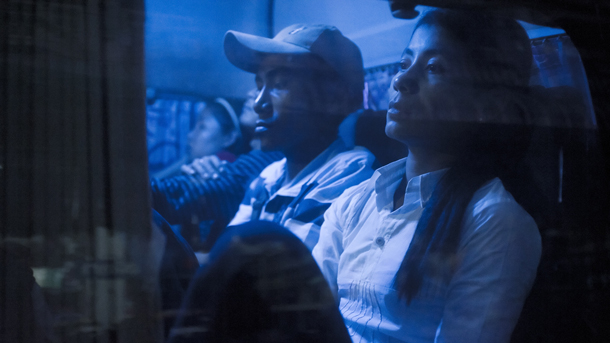The sun has already set on a rundown apartment building down a quiet narrow alley near the Mae Sot-Myawaddy border. A large group of Burmese migrant workers congregate outside.
They have been waiting for the Thai agency to process their visas since the early afternoon. They already spent hours queuing up, in the hot summer sun, on the Friendship Bridge to get day passes to enter Thailand. The agency charged them 400 baht (US $12.70) for the pass, even though it officially only costs 20 baht.
The agency is just one of dozens which have sprung up along the border in recent months, cashing on the looming June 14 deadline for National Verification. The new Thai law requires foreign workers from Burma, Cambodia and Laos to be legally registered to work in the country.
Answering the call of a Thai labor crisis, thousands of Burmese workers cross into Mae Sot every day, hoping to earn a salary several times higher than in their native Burma.
Along the highway leading to the Friendship Bridge, larger crowds of migrant workers wait outside other agencies. With bags in toe, scores of mini-buses wait to transport them to Bangkok and with them their dreams of making money. The scene is reminiscent of a gold rush. However in this scenario, where migrant workers can expect to pay 10 times the official fee (500 baht) for a one-year visa, it’s obvious who the prospectors are and who is getting mined.
Several years ago, the Thai government announced that all foreign workers must be registered or risk deportation. The deadline was extended several times after rights groups complained about the impracticalities of registering millions of migrant workers throughout the country.
There are an estimated 2-3 million Burmese migrant workers in Thailand, making up about 5 percent of the total Thai work force.
The annual remittance from Burmese nationals working overseas is more than $3.6 billion, Burma’s Deputy Labour Minister Myint Thein told Thai press in April, following a meeting with Thai ministers to iron out the details for the implementation of the National Verification process, according to a Bangkok Post article.
Ironically, he praised the significant contributions Burmese migrant workers had made to the country’s economic growth.
Some people wonder if the real reason Naypyidaw is supporting the National Verification process is to collect taxes from the millions of Burmese working abroad.
Others, from ethnic areas where corruption by local authorities is still rampant, worry that the personal information they are required to provide to get a passport will be exploited to extort money from relatives back home.
Sam Win is from Karen state. He used to work on a garbage truck in Bangkok, earning 150 baht ($4.77) a day. When heavy flooding ravaged Thailand’s largest city causing a mass exodus of migrant workers, he had to leave without collecting his salary.
Unfortunately, Sam Win was one of the thousands of migrant workers who got caught in a Thai police net on the way back to the border.
Immigration officers delivered him to the Border Guard Force on the Thai side of the Myawaddy River, where he had to pay a 2,500-baht ($80) bribe or risk being sold to human traffickers.
Nearly one year later, Sam Win finds himself sitting on a curb in Mae Sot, waiting three days for an agency to process his Thai visa. He is only a five-minute drive, by detention center truck, from the spot where the Thai police deported him.
The Thai visa and Burmese passport cost him 10,000 baht, money he had to borrow to pay. Although Sam Win doesn’t have a confirmed job in Bangkok, he hopes to return to his municipal employment.
Before coming back to Thailand, he tried to make money in his village farming, but gave up because the earnings were too low.
His relative, Tin Aung, who is also waiting for a Thai visa, does not have a job either. But he still paid 16,000 baht (over $500) for his Burmese passport and Thai visa because he was in a hurry.
For the last eight years, Tin Aung worked on boats in Pattaya. Last month, with the National Verification deadline approaching, he decided to return to Burma to get his passport.
“I didn’t want to pay the human smugglers to travel back home so I turned myself in to Thai immigration, who deported me to the border,” said Tin Aung.
Now a month later, he is anxious to return to bangkok where his wife and daughter are waiting. Tin Aung couldn’t afford to pay for their documents, which means after June 14, only he will able to legal in the family.
Despite all the money he had to borrow to obtain his visa and passport, Tin Aung says he is “happy” to finally have legal status in Thailand.
“The last time I worked here, I was always felt afraid of the police. Now I can go wherever I want. For the first time [in Thailand] I feel freedom,” said Tin Aung.
















